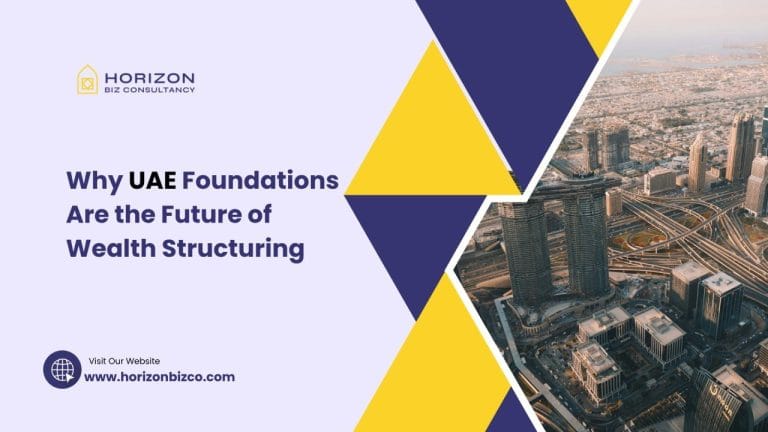As global wealth expands across generations, high-net-worth individuals (HNWIs) and founders face a rising challenge: managing complex, cross-border holdings while preserving control, privacy, and intergenerational continuity.
This is where the UAE Foundation stands out, not merely as a legal vehicle but as a strategic wealth structuring solution.
In this article, we go beyond the basics to explain:
- Why traditional holding structures are no longer enough
- The operational, tax, and succession planning advantages of UAE Foundations
- What makes the UAE’s legal environment so attractive
- How to consolidate global assets into one compliant, transparent entity
The Problem: Fragmented Holdings and Fragile Legacies
Many wealthy families and entrepreneurs hold a mix of real estate, private equity, intellectual property, and operating businesses, often scattered across different jurisdictions under multiple legal entities or nominee arrangements.
This fragmentation can lead to:
- Tax inefficiencies due to siloed ownership
- Increased exposure to legal disputes, forced heirship laws, and inheritance claims
- Lack of privacy and diminished control, especially in onshore jurisdictions
- Complications in succession and intergenerational wealth transfer
Even thriving assets can become difficult to manage, transfer, or protect without a clear, unified structure.
Why UAE Foundations Offer a Strategic Advantage
A UAE Foundation, governed under DIFC, ADGM, or RAK ICC frameworks, is a unique hybrid between a trust and a corporate entity. It allows founders to separate legal ownership from beneficial interest while retaining control over how assets are managed and distributed.
Key Advantages:
- 0% Corporate Tax (on passive income, under current UAE tax law)
- 100% Foreign Ownership
- Legal Personality: Unlike a trust, a foundation is a stand-alone legal entity
- Strategic Control retained by the Founder via the Council or Guardian
- Built-In Succession Planning through custom bylaws and charters
- No Minimum Share Capital; flexible for real estate, shares, crypto, or IP
- Confidentiality: Especially under RAK ICC, where disclosure is limited
- Asset Protection from personal liabilities or creditor claims
- Global Recognition under common law jurisdictions
Real-World Use Cases of UAE Foundations
- Consolidating Global Holdings: Real estate in the UK, startup shares in India, and digital assets in one structure
- Intergenerational Wealth Transfer: Create clear and custom succession mechanisms
- Control Without Legal Ownership: Maintain influence while limiting exposure
- Post-Exit Wealth Management: Hold sale proceeds securely and tax-efficiently
- Investor-Ready Structuring: Clean cap tables for angel or VC investments
Philanthropic Capital Management: Structure ESG or charitable initiatives strategically
UAE Foundations vs Other Jurisdictions: Quick Comparison
| Criteria | UAE Foundation | BVI Company | Singapore Trust |
| Legal Ownership | Yes | Yes | No (Trustee holds) |
| Tax on Passive Income | 0% (with conditions) | 0% | 0% |
| Beneficial Ownership | Protected (RAK ICC) | Disclosable | Protected |
| Succession Planning | Integrated | Not native | Strong |
| Cross-Border Acceptance | High | Declining | Moderate |
Why UAE is the Ideal Jurisdiction for Foundations
Dubai and Abu Dhabi offer a unique blend of legal certainty, global banking access, tax efficiency, and economic substance. Whether under DIFC Common Law, ADGM’s progressive regime, or the confidentiality of RAK ICC, UAE Foundations are emerging as the preferred choice for globally mobile families and founders.
How Horizon Biz Consultancy Can Support You
At Horizon Biz Consultancy, we work alongside leading legal advisors and tax professionals to offer end-to-end support:
Our approach goes beyond structuring; we focus on building enduring relationships to help you protect and grow your wealth for generations.
In Summary:
If your wealth is dispersed across jurisdictions and your goals include protection, privacy, control, and long-term legacy planning, then a UAE Foundation is not just a tool; it’s a strategic asset.
- Simplify complexity
- Strengthen protection
- Enable smarter succession planning
Let’s build your foundation strategy today.
FAQ’s
A UAE Foundation is a legal entity without shareholders, typically governed by a charter and managed by a council. It allows the founder to separate personal assets from business interests, providing long-term wealth preservation, succession planning, and asset protection—while ensuring full compliance with local laws.
DIFC Foundations offer strong legal certainty, flexibility, and confidentiality. Key advantages include perpetual existence, zero corporate tax, protection from forced heirship claims, and the ability to hold assets globally. They are ideal for high-net-worth individuals seeking cross-border wealth structuring.
The UAE attracts billionaires due to its tax-friendly environment (no personal income tax), political stability, luxury lifestyle, high-quality infrastructure, and safe jurisdiction for asset protection. Moreover, regulatory frameworks like the DIFC enhance privacy and long-term planning.
While historically dependent on oil, the UAE has diversified its economy. Wealth today also comes from finance, real estate, tourism, logistics, and tech startups. Dubai and Abu Dhabi are hubs for regional and international investment.
A DIFC Foundation is a standalone legal entity, whereas a trust is a fiduciary relationship. Foundations provide greater control and transparency, especially for succession planning, while trusts often involve a trustee managing assets for beneficiaries.
Costs vary by jurisdiction (DIFC or ADGM), but typically range from AED 15,000 to AED 30,000, including government fees and professional setup charges. Ongoing annual costs may include renewal fees and legal/accounting services.





